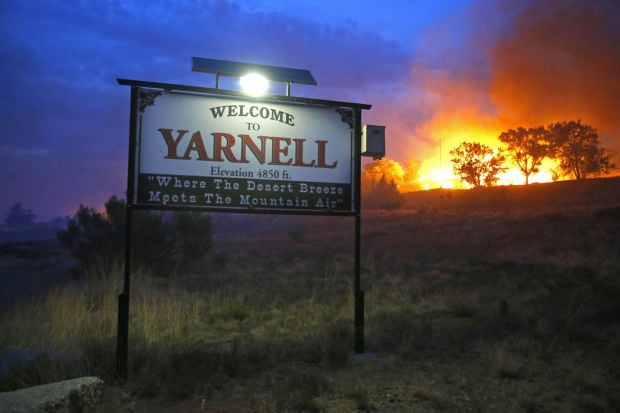An attorney for Yarnell residents who were burned out in the 2013 blaze contends Arizona must compensate them for their losses because it failed to confine the lightning-caused fire to the state trust lands where it started.
In what he admits is an untested legal theory in Arizona, David Abney cited common law going back to England in the 1400s that imposed liability on a property owner who lets a fire escape and injure a neighbor. He said it’s irrelevant that the state was not responsible for the blaze in the first place.
“It’s very close to a form of strict liability,” Abney said.
The somewhat unique claim comes in new legal filings as Abney asks the state Court of Appeals to allow the homeowners to pursue their lawsuit against the state. It is part of his effort to give his clients a chance to make their claim to a jury.
He needs appellate court intervention because Maricopa County Superior Court Judge Richard Gama earlier this year threw out the case after concluding the state, in fighting the fire on public lands, had no duty to specifically protect Yarnell residents and their property. Abney is making various arguments — including the one about neighbor liability — in a bid to have the lawsuit reinstated.
If the appellate court accepts the theory it would do more than pave the way for a trial. It would set binding precedent that would affect all future lawsuits and expose landowners to lawsuits when a fire spreads beyond their own property.
The fire destroyed more than 120 homes and resulted in the deaths of 19 firefighters.
In his appellate court filings, Abney told the judges that adopting a rule making neighbors liable when a fire spreads makes sense, especially in this case. He called it “fair and workable,” noting that only the state “can legally or effectively extinguish, suppress or contain it.”
But Abney is not relying entirely on this theory.
He points out that the state did, in fact, try to fight the fire beyond the trust lands. And at that point, Abney said, the state assumed the duty to protect the homeowners — and they had a right to assume it would be done properly.
He compared it to a situation where someone passing by a pond sees a child who is drowning.
“I can just keep walking,” he said. “I have no liability. I don’t have to rescue the child.”
Abney said all that changes if the person does jump in.
“But if I see a child drowning in a pond and I leap to the child’s aid and try to rescue the child and drown the child because I do it in a negligent way, then I am liable,” he explained.
He said once the firefighting efforts expanded beyond state lands, those fighting the fire had a responsibility to do it in a responsible fashion.
And Abney said if he is allowed to take the case to trial, the evidence will back him up.
“The Yarnell Hill Fire was just a comic opera that ended in complete tragedy, not only for the people of Yarnell but the 19 firefighters that got cut off (from an escape route) and killed because of the state’s utter incompetence,” he said.
“They had about 350 firefighters and all the equipment you could ever want for and they did nothing effective to combat and suppress that fire for three days,” Abney continued. “They didn’t even build any effective fire breaks to protect the only community in the area.”
Abney said because the homeowners trusted the state would fight the fire they did not take emergency measures to protect their homes, ranging from brush clearing and trimming vegetation to removing portable propane tanks.
He acknowledged if the case does go to trial, the failure of the homeowners to take those measures could be used by the state to argue that they are at least partly responsible for the loss of the structures. At that point, if jurors conclude the state has some liability, they then could reduce the payouts to the homeowners.
In its own filings, the Attorney General’s Office has acknowledged the state did attempt to fight the blaze but contends that was done only to protect the state’s own land. It also argues the state is not liable for harm to other property owners when the damage is caused by the “natural condition” of the land.
The 19 firefighters who died were members of the Granite Mountain Hotshots. A negligence claim by the families of 12 of the firefighters was settled in July for $50,000 apiece and promises by the state of changes in the way it fights fires.





